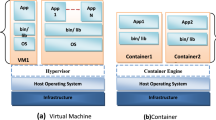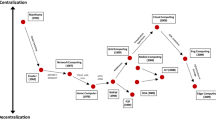Abstract
Current supercomputing centers usually deploy a large-scale compute system together with an associated data analysis or visualization system. Multiple scenarios have driven the demand that some associated jobs co-execute on different machines. We propose a multi-domain coscheduling mechanism, providing the ability to coordinate execution between jobs on multiple resource management domains without manual intervention. We have evaluated our mechanism based on real job traces from Intrepid and Eureka, the production Blue Gene/P system and a cluster with the largest GPU installation, deployed at Argonne National Laboratory. The experimental results show that coscheduling can be achieved with limited impact on system performance under varying workloads.
Similar content being viewed by others
References
Abbasi H, Wolf M, Eisenhauer G, Klasky S, Schwan K, Zheng F (2009) DataStager: Scalable data staging services for petascale applications. In: Proc of ACM international symposium on high performance distributed computing (HPDC)
Basney J, Livny M (1999) Improving goodput by co-scheduling CPU and network capacity. Int J High Perform Comput Appl 13(3):220–230
Binns J, Dech F, Papka M, Silverstein J, Stevens R (2005) Developing a distributed collaborative radiological visualization application. In: From Grid to HealthGrid, pp 70–79
Blue Gene Team (2008) Overview of the IBM Blue Gene/P project. IBM J Res Devel
Cobalt project. http://trac.mcs.anl.gov/projects/cobalt
Czajkowski K, Foster I, Karonis N, Kesselman C, Martin S, Smith W, Tuecke S (1998) A resource management architecture for metacomputing systems. In: Proc of job scheduling strategies for parallel processing (JSSPP)
Etsion Y, Tsafrir D (2005) A short survey of commercial cluster batch schedulers. Technical Report 2005-13, the Hebrew University of Jerusalem
Frachtenberg E, Feitelson D, Petrini F, Fernandez J (2003) Flexible coscheduling–mitigating load imbalance and improving utilization of heterogeneous resources. In: Proc of IEEE international parallel & distributed processing symposium (IPDPS)
Foster I, Kesselman C, Lee C, Lindell R, Nahrstedt K, Roy A (1999) A distributed resource management architecture that supports advance reservations and co-allocation. In: Proc of international workshop on quality of service
Huedo E, Montero R, Llorente I (2004) A framework for adaptive execution in grids. Softw Pract Exp 34(7):631–651
MacLaren J (2007) HARC: the highly-available resource co-allocator. In: Proc. of GADA’07. LNCS, vol 4804. Springer, Berlin, pp 1385–1402
Moab workload scheduler. http://www.adaptivecomputing.com
Ousterhout J (1982) Scheduling techniques for concurrent systems. In: Proc of IEEE int’l conference on distributed computing systems (ICDCS)
Petrini F, Feng W-C (2000) Buffered coscheduling: a new methodology for multitasking parallel jobs on distributed systems. In: Proc of IEEE int’l parallel & distributed processing symp (IPDPS)
Romosan A, Rotem D, Shoshani A, Wright D (2005) Co-scheduling of computation and data on computer clusters. In: Proc of int’l conf on scientific and statistical database management
Sobalvarro P, Pakin S, Weihl W, Chien A (1998) Dynamic coscheduling on workstation clusters. In: Proc of job scheduling strategies for parallel processing (JSSPP)
Sobalvarro P, Weihl W (1995) Demand-based coscheduling of parallel jobs on multiprogrammed multiprocessors. In: Proc of job scheduling strategies for parallel processing (JSSPP)
Smith W, Foster I, Taylor W (2000) Scheduling with advanced reservations. In: Proc of IEEE int’l parallel & distributed processing symposium (IPDPS)
Tang W, Lan Z, Desai N, Buettner D (2009) Fault-aware, utility-based job scheduling on Blue Gene/P systems. In: Proc of IEEE int’l conf on cluster computing
Tang W, Desai N, Buettner D, Lan Z (2010) Analyzing and adjusting user runtime estimates to improve job scheduling on the Blue Gene/P. In: Proceedings of IEEE international parallel & distributed processing symposium (IPDPS)
Tang W, Desai N, Vishwanath V, Buettner D, Lan Z (2011) Job coscheduling on coupled high-end computing system. In: Proc of int’l conf on parallel processing workshops (ICPPW)
Teodoro G, Sachetto R, Sertel O, Gurcan M, Meira W, Catalyurek U, Ferreira R (2009) Coordinating the use of GPU and CPU for improving performance of compute intensive applications. In: Proc of IEEE int’l conf on cluster computing
Townsley D, Bair R, Dubey A, Fisher R, Hearn N, Lamb D, Riley K (2009) Large-scale simulations of buoyancy-driven turbulent nuclear burning. J Phys, Conf Ser 125(1)
Tsafrir D, Etsion Y, Feitelson D (2007) Backfilling using system-generated predictions rather than user runtime estimates. IEEE Trans Parallel Distrib Syst 18(6):789–803
Vadiyar S, Dongarra J (2002) A metascheduler for the grid. In: Proc of 11th IEEE international symposium on high performance distributed computing (HPDC)
Vishwanath V, Hereld M, Morozov V, Papka ME (2011) Topology-aware data movement and staging for I/O acceleration on BlueGene/P supercomputing systems. In: Proc IEEE/ACM international conference for high performance computing, networking, storage and analysis (SC)
Vishwanath V, Hereld M, Papka ME (2011) Simulation-time data analysis and I/O acceleration on leadership-class systems using GLEAN. In: Proc of IEEE symposium on large data analysis and visualization
Wiseman Y, Feitelson D (2003) Paired gang scheduling. IEEE Trans Parallel Distrib Syst 14(6):581–592
Yoshimoto K, Kavatch PA, Andrews P (2005) Co-scheduling with user settable reservations. In: Proc of job scheduling strategies for parallel processing (JSSPP)
Author information
Authors and Affiliations
Corresponding author
Rights and permissions
About this article
Cite this article
Tang, W., Desai, N., Vishwanath, V. et al. Multi-domain job coscheduling for leadership computing systems. J Supercomput 63, 367–384 (2013). https://doi.org/10.1007/s11227-012-0741-6
Published:
Issue Date:
DOI: https://doi.org/10.1007/s11227-012-0741-6




